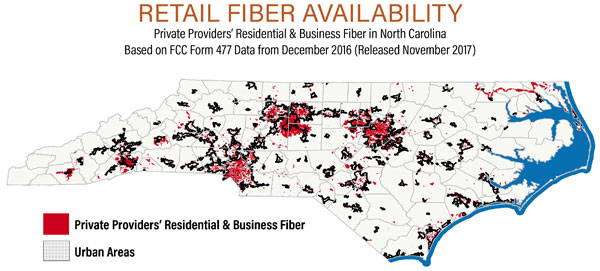
March 21, 2019; Daily Advance (Elizabeth City, NC)
Following the lead of Mississippi, which passed similar legislation earlier this year, North Carolina state representatives are proposing to help electric co-ops offer high-speed internet in underserved rural parts of the state, reports Jon Hawley for the Elizabeth City Daily Advance. The measure, introduced by a bipartisan group of 34 sponsors, “would remove restrictions on electric membership corporations supporting or providing broadband internet.”
Representative Howard Hunter III (D-Hertford), who is lead author, notes that what’s behind the drive for legislation is that “we need broadband bad.” Hunter adds, “That’s the talk of the session.”
Unlike Mississippi, where an outright ban on electric co-ops offering broadband existed until a law was passed this past January, North Carolina state law doesn’t forbid electric co-ops from offering internet, “but it does make it harder and more expensive,” notes Hawley.
Sign up for our free newsletters
Subscribe to NPQ's newsletters to have our top stories delivered directly to your inbox.
By signing up, you agree to our privacy policy and terms of use, and to receive messages from NPQ and our partners.
House Bill 387, and its companion legislation, Senate Bill 310, would make three key changes, as Nelle Hotchkiss, chief operating officer for North Carolina Electric Cooperatives, the state trade association, explains:
- The bill would amend a 1999 law in order to authorize the state’s 26 electric co-ops to seek US Department of Agriculture funding for broadband projects, defined as download speeds of at least 25 Megabits per second (Mbps) and uploads of at least 3 Mbps. As in Mississippi, it would appear the availability of $600 million in federal rural broadband funding is one factor prompting legislative action.
- The law would exempt broadband activities from a requirement that cooperatives’ business ventures “fully compensate” the cooperatives for the use of personnel, services, equipment, and property. Essentially, the current law, by making the co-op charge existing infrastructure to new broadband projects, greatly elevates the costs to the co-op of expanding broadband service, discouraging this investment from being made.
- The law would specify that easements that cooperatives already hold for electricity may also be used for broadband.
The goal, Hotchkiss explains, is that the co-ops would offer rural customers internet with existing fiber. This means that broadband service shouldn’t need to take up any more space on a property than current utility cabling already does. Given their existing infrastructure and nonprofit status, Hotchkiss says that North Carolina electric co-ops should be able to offer very cost-effective service, with prices set basically to generate enough revenue to cover maintenance costs.
If the bill passes, Hotchkiss says NC Electric Cooperatives would pilot a business model with River Street Networks of Wilkesboro, an existing internet service provider.
Hawley notes that one big looming question “is whether large cable and internet companies will oppose it for enabling competition.” Hotchkiss says she hopes those companies will support, or at least remain neutral, on the legislation, since the co-op efforts would be focused on serving areas where for-profit companies have few or no customers. In Mississippi, as NPQ’s Debby Warren explained, there was an extensive public campaign for the legislation, with more than 60 county board and 70 city councils passing resolutions of support. As a result, cable and telecom firms mainly steered clear and allowed the legislation to sail through. Have North Carolina advocates of co-op broadband done their grassroots political homework? We may soon find out.—Steve Dubb













